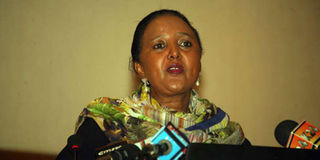Why size of fight in Amina's quest for top AU job matters

Amina Mohamed, the Cabinet Secretary for Foreign Affairs and International Trade, at the InterContinental Nairobi hotel on August 18, 2016. PHOTO | EVANS HABIL | NATION MEDIA GROUP
What you need to know:
This time round, the East African Community has a candidate in the fight and the size of the fight in her matters.
Amina Mohamed, Kenya’s Foreign Affairs Cabinet Secretary, has a fighting chance of leading the African Union Commission.
The week-long process to culminate in the election of the chairman of the African Union Commission, the administrative and implementing arm of the African Union (AU), gets under way in Addis Ababa today.
Advance parties begin the heavy lifting that paves the way for the AU Assembly, the policy-making heads of state and government summit, pencilled in for January 30 and 31.
While the Assembly will, inter alia, adopt an annual calendar, determine policy and priorities and, monitor implementation, global attention will be centred exclusively on the election of the chairman of the Commission.
The Assembly will tick the education, experience, leadership, achievement and vision (and strategy) criteria boxes of the contestants but a key requirement for the job is missing.
West, Central, North and Southern Africa have fought viciously as their candidates have been pitted against each other in an oft unedifying appointment by presidents and premiers via a ballot predicated on regional interests.
This time round, the East African Community (EAC) has a candidate in the fight and the size of the fight in her matters. Ms Amina Mohamed, Kenya’s Foreign Affairs Cabinet Secretary, has a fighting chance of leading the AU Commission. Herewith campaign opportunities Nairobi should capitalise on this week.
One, the Assembly failed to vote in a Commission chairman in July in Kigali because the Economic Community of West African States (Ecowas) judged all contestants – Botswana’s Pelonomi Venson-Moitoi, Equatorial Guinea’s Agapito Mba Mokuy and Uganda’s Specioza Kazibwe – unqualified for the job.
DROPPED OUT
Two, in the first ballot the trio garnered measly 16, 12 and 11 votes respectively. Dr Kazibwe dropped out of round two, but still Dr Moitoi could only increase her tally to 23.
This buttresses the view that the Assembly led by Ecowas gave the candidates short shrift. That a majority of the 51 heads of state and government present abstained during the second ballot betrays a deliberate plot to block attainment of the mandatory 65 per cent majority and force a fresh poll.
Dr Moitoi and Mr Mokuy are legally on the ballot again, but cannot possibly persuade Ecowas in particular, and the Assembly in general, that six months later they qualify to lead the Commission.
Three, the candidacy of Dr Moitoi, who is representing the Southern African Development Community (SADC), is further undermined by her own President Ian Khama. He has not attended an AU summit since taking power in 2008; he upbraids African leaders for their poor human rights records; has no track with the vast majority out to delegitimise the International Criminal Court (ICC); and famously asked nonagenarian neighbour Robert Mugabe to hand over power to a younger Zimbabwean. He can expect few friends and fewer votes in the Assembly.
This may explain why last week Amina campaigned in Southern Africa. EAC has only six votes and SADC has 14 (excluding Tanzania’s). Nairobi’s strategy would appear to be to rope in SADC, pick up more votes elsewhere and go into the first ballot assured of the support of at least 25 countries.
SENEGALESE POLITICIAN
Four, Ecowas, which did not have a candidate in Kigali, now has Senegalese politician, academic and diplomat Prof Abdoulaye Bathily in the ring. Kenya jumped into the fray when Dr Kazibwe failed to make the cut at the first count. Then, Chad’s Foreign Affairs Minister Moussa Faki Mahamat, whose country straddles Central and North Africa, and whose President Idriss Deby is the ceremonial AU Chairman, threw his hat into the ring.
Nairobi’s argument against Prof Bathily and Mr Mahamat must be that since West Africa has produced two out of the last four Commission chairmen, and immediate former chairman Jean Ping and outgoing Nkosazana Zuma are from Central and Southern Africa respectively, East Africa deserves a turn.
Five, Nairobi must keep reminding Africa that Amina brought the World Trade Organisation and the Tokyo International Conference on Africa’s Development to the continent for the first time in 2015 and 2016 respectively and Unctad for the third time also last year.
This, Nairobi may argue, explains why she has been endorsed by Algeria in the north, Angola in the southwest, Ethiopia in the Horn, Sierra Leone and Togo in the west and Malawi in the southeast. Last, not least, Nairobi has the ICC card. If the AU Assembly still admires Amina’s two-year-long campaign of demonisation and delegitimisation of the court, ICC could hand EAC the sudden death penalty kick to end the contest.





